Echo's Devery Jacobs talks working with Elliot Page on new queer cheerleading movie
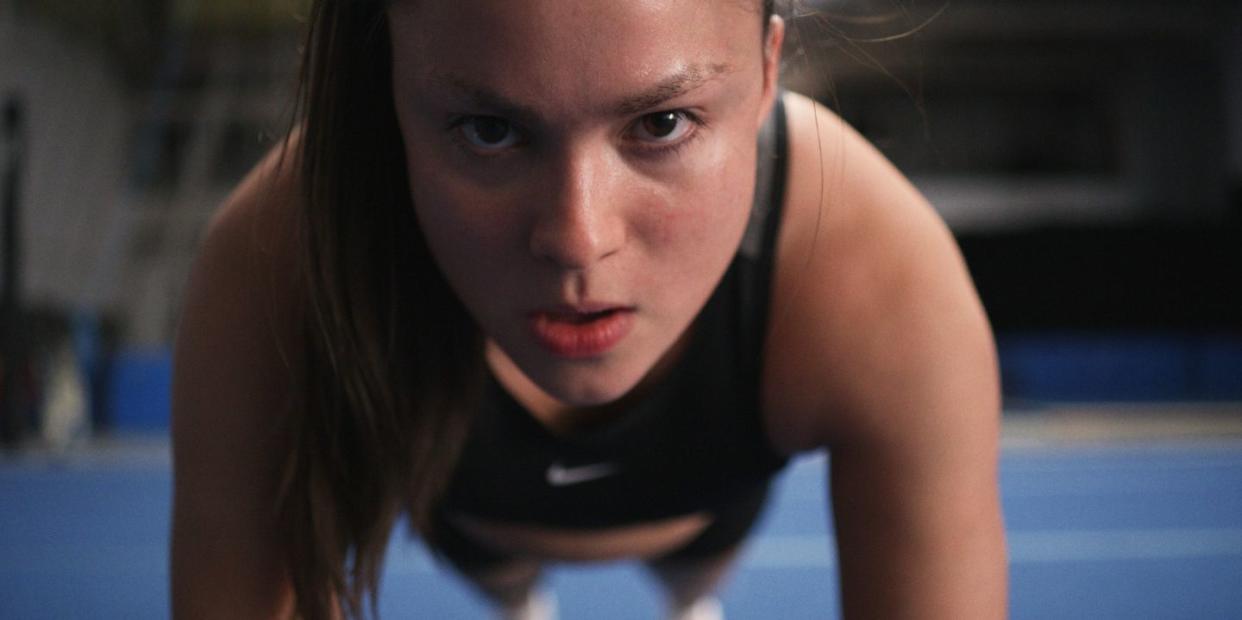
Rainbow Crew is an ongoing interview series that celebrates the best LGBTQ+ representation on screen. Each instalment showcases talent working on both sides of the camera, including queer creatives and allies to the community.
Next up, we're speaking to Backspot star Devery Jacobs.
Cheerleading is super gay. And by that we mean the sport has had a long queer history in film and TV, from the girls in Glee and Natasha Lyonne's But I'm a Cheerleader to the homoeroticism of Jennifer's Body and pretty much everything Eliza Dushku did in Bring It On. If her role as Faith in Buffy didn't make you gay, Eliza's Missy Pantone sure did.
But what's been missing from this narrative is not just a cheerleading film where the queerness is text rather than subtext, but also a film where the conflict doesn't even come from being queer in the first place.
Enter Backspot, a Canadian coming-of-age film where the protagonist, a cheerleader named Riley, has already come of age in terms of finding herself and expressing her queer Native identity. So instead, the conflict here arises from the pressures that competing can put on any young person, but especially those who are already marginalised to begin with.
Backspot director D W Waterson has assembled a phenomenal cast for her debut feature, including Shannyn Sossamon as Riley's mother and the legendary Evan Rachel Wood as a lesbian cheerleading coach who may or may not be the role model that Riley needs right now.
But it's Riley herself, Devery Jacobs, who pulls the film together with the performance that she's "probably most proud of" in her whole career. And that's really saying something.
Since her award-winning breakout role in 2013's Rhymes for Young Ghouls, Devery's impressed in everything from American Gods and Marvel fare like Echo to writing, directing and starring in Reservation Dogs, which might just be the most critically loved show anyone's seen this decade.
Through it all, Jacobs has championed queer representation, Native representation, and the intersection of the two where her own identity lies, which is perhaps best represented in her roles as both star and producer, as which she worked for six years to bring Backspot to life.
Digital Spy caught up with Devery Jacobs to discuss intergenerational queerness, working alongside Elliot Page as a producer, and of course, Harriet the Spy, literature's most severely underrated queer icon.
We love how Backspot reworks typical sports movie tropes through a queer lens. That's a combination we rarely get to see on screen. Can you talk us through that unique interplay?
I was a former athlete. I was a provincial champion gymnast in Canada growing up. So for us, making sure we wanted to tell the story of Backspot as an inherently queer film, we wanted to do a couple of things.
We wanted to make sure that the conflict wasn't rooted in the queerness. In so many coming-of-age films or projects with younger people, it's all about coming out and how traumatic that is and whether your family accepts you or not. We've seen that a lot of times, so we wanted to move past the coming-out story and to see what it's like to be a young queer person now who's out and whose family know and are accepting.
There's a whole other life after coming out that we wanted to dive into, some of that being the relationship between Amanda and Riley. It was just a romantic relationship, but it was important for us that we aren't splitting them up and causing all this trauma.
Yes, there ends up being some conflict between them and they sort it out, but ultimately, they end up together. We wanted it to be an optimistic ending and show that queer relationships are not only limited to romantic relationships or are not only limited to sexuality.
So often, cis straight culture perceives our community as only being about sex or sexuality, when really it's about who we are and how we view the world and being in opposition with the world. There's so much more to being queer than who you go to bed with.
With Backspot, we wanted to show some of the different types of relationships between queer folks and especially intergenerational queer folks. It's not super in-your-face throughout Backspot, but it is baked into the fabric of the script, there being a generational gap. There's incredible admiration that we have for our queer elders with respect and homage that we need to pay to them in order for us to, firstly, have had the rights that we do now, and to be out and open. There are so many trailblazers that have come before us.
I also think with that freedom, we're sometimes seen as taking for granted the rights that we have. I also think that sometimes there's a bit of resentment and bitterness from older generations with the rights that we might have.
Through the relationship between Eileen and Riley, this admiration and adoration and idolisation – also with Eileen kind of being Riley's antagonist, treating her with an iron fist and this tough-love mentality – I think there is a fraught relationship in that that we wanted to explore.
Also bridging these generational gaps between queer folks is the relationship with Devon, the assistant coach. I think all of us as young queer people have wanted somebody like Devin who will call us on our shit but also let us know it's gonna be okay and we'll be there with an eyebrow pencil and Gatorade when the time is ready [Laughs].
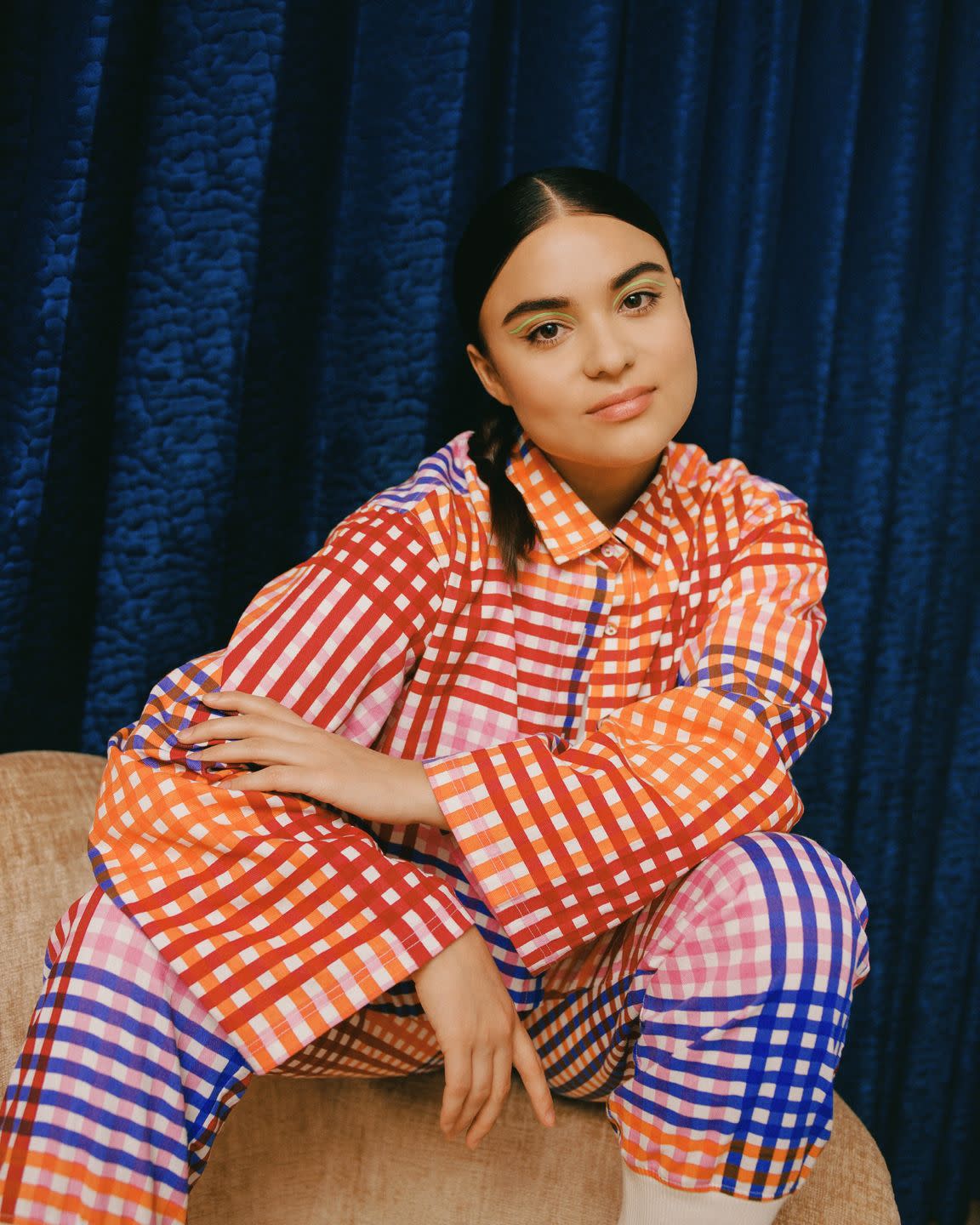
What was it like working with Evan Rachel Wood on set? She's effectively a queer elder you can learn from offscreen as well I imagine.
Oh my gosh, she is the sweetest person ever. We had created a dream list of actors who we wanted to work with, being Evan Rachel Wood for Eileen and Shannyn Sossamon as Tracy, Riley's mum. I don't know how it happened, in what world would we ever get our first choices of actors it was. It was really incredible.
When Evan came on, she acknowledged and knew that as somebody with her experience, she would be uplifting our project by coming on to it, which we greatly appreciated.
She made a reference to Thirteen, how Holly Hunter was the established actor on Catherine Hardwicke's debut feature, how Holly had come on board knowing that this was an up-and-coming filmmaker so she was able to get more attention onto it because of who she was, lending her voice in that way. Evan had also said the same for us. She was like, "I really believe in this project".
It was funny when she was reading the script for the first time, she was like, "I can't believe they want me to be a cheerleader". And then she got to the point where Eileen arrives and she was like, "That's me! I'm the coach!"
Sometimes there's this disconnect with actresses and who they can play. She was really happy to see that she got to be an adult in it and got to be the hard-ass coach. She just brought so much to Eileen, she's brought so much to the project.
Working with her was really great. She might be intimidating as all hell on camera, but as soon as you yell "Cut!" she just dissolves into her bubbly, very silly self.
You also worked with Elliot Page, who's been involved in a producing capacity. He's been doing such incredible work in queer spaces, particularly in the last few years. Can you talk us through collaborating with Elliot and what he brought to the project?
I have been such a fan of Elliot Page for so long. Not only is he an advocate for 2SLGBTQ+ rights, but also indigenous rights and environmental and racism activism. Getting a chance to work with him has been awesome.
He and his team at PageBoy Productions have been the most hands on EP's that we ever could have imagined. I thought maybe he would be stamping his name on and we're like, "Thank you very much. This will help us navigate the system and get some access," but they've been involved in every meeting and every conversation and every step of the way.
Yet there's also been an incredible sense of freedom that Elliott and his team at Pageboy have provided us where they are helping us see our vision through, myself and DW Waterson, the director.
We were wondering because sometimes when you bring producers on, they want to get their fingerprints on things or they have ideas of who should be cast, but PageBoy Productions were like, "We will only help you achieve what you want." That's been an incredible process.
Getting Elliot on board really opened the doors for us to be able to access financing and to be able to get the project together.
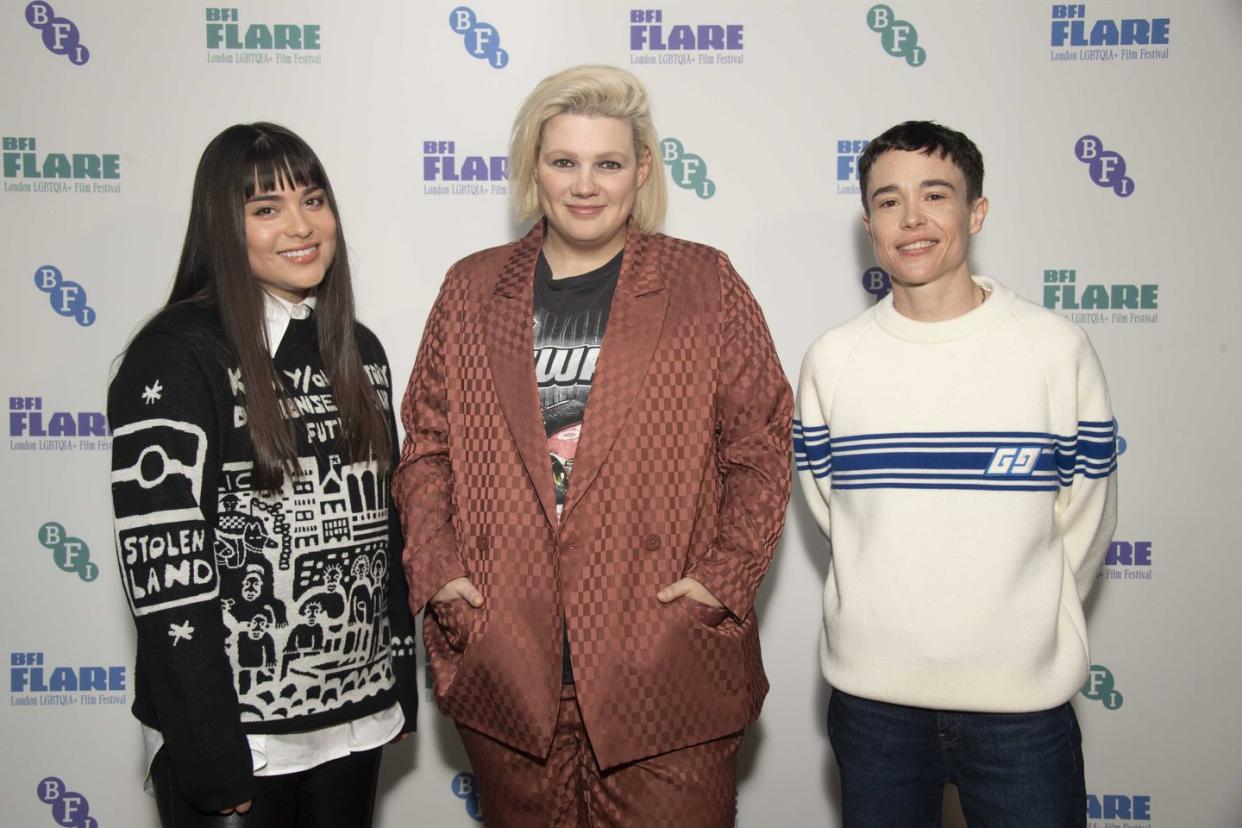
There's so much physicality to your performance as Riley. You're doing the actual gymnastic routines yourself, which seems physically taxing, and then as viewers, we're also experiencing Riley's panic attacks and the hair-pulling in a visceral way too. How did it feel physically and mentally for you to endure that as Riley on set?
In terms of the physicality, that's how Riley gets out her stress, gets out her anxiety. For us, exploring conversations about OCD in the different ways that it manifests.
With Shannyn Sossamon's character, Tracy, obviously it's a more traditional form of obsessive-compulsive disorder. It's actually hereditary and so with Riley, it manifests through something called trichotillomania, which is the hair pulling. It's something that a lot of people go through that is not widely talked about. It's a very common disorder.
The pressures that queer athletes, well, the pressures that queer people, that young women, and then athletes in general face, let alone when they're combined in that same body, the pressures that they face are so surmounting that there needs to be some level of relief.
With Riley, she really pounds her body into the ground when it comes to her obsession and need for appeasing and pleasing Eileen, and then in private, this really vulnerable act of her hair pulling.
Beyond queer representation, Native representation is also hugely important in regard to Backspot's impact. Sometimes being Native is just incidental, an organic part of the story, and in other roles that aspect of your identity is an important cultural touchstone. How do you navigate that and do you feel a responsibility to maintain that balance in your work?
I absolutely feel a sense of responsibility. It's one that I don't carry lightly and it's something that I'm happy to take on. But as an actor, I also don't want to be pigeonholed and limited to what type of stories I'm allowed to tell.
For me, as a storyteller, when I'm in front of the camera purely as an actor, I'm more interested in exploring characters outside of myself and I'm down to help filmmakers realise their vision and tell their stories.
When I'm on the filmmaking side of things, for me, it's really important to explore passion projects and stories from my own communities, as an Indigenous person, as a Mohawk person who grew up on my rez, but also as a queer person. Finding that balance is really important to me.
A lot of people have, in the past, underestimated Indigenous actors, thinking that, "Oh, they're just playing themselves. They're not actually actors," and you're capturing what is organically from this person. That hasn't been my experience. I like playing characters who are much more badass. I am much geekier and soft-spoken in my real life. But I think I never would have been cast in in a role like Riley in Backspot had I not created this role for myself.
People still have a very narrow idea of what Indigenous actors look like. Even when we were trying to acquire funding, we didn't get it the first time around, so we asked for some feedback. We were told, "Well, we don't understand why this protagonist is Indigenous. It feels like it's just pasted in there."
I was like, "What? Are there not enough tepees in this movie? Is there not enough Indigenous struggle on the rez?" Like, I didn't go to gymnastics competitions and meet people who are like, "Why are you Native though?" It's a part of who I am. I'm an athlete.
Being able to have that freedom to tell stories that I want to tell that reflect my experience in my community are just as valid as other stories that I might be a part of that do take place on the rez and do revolve around Indigenous identity. Both are valid and for me are really important to be able to portray.
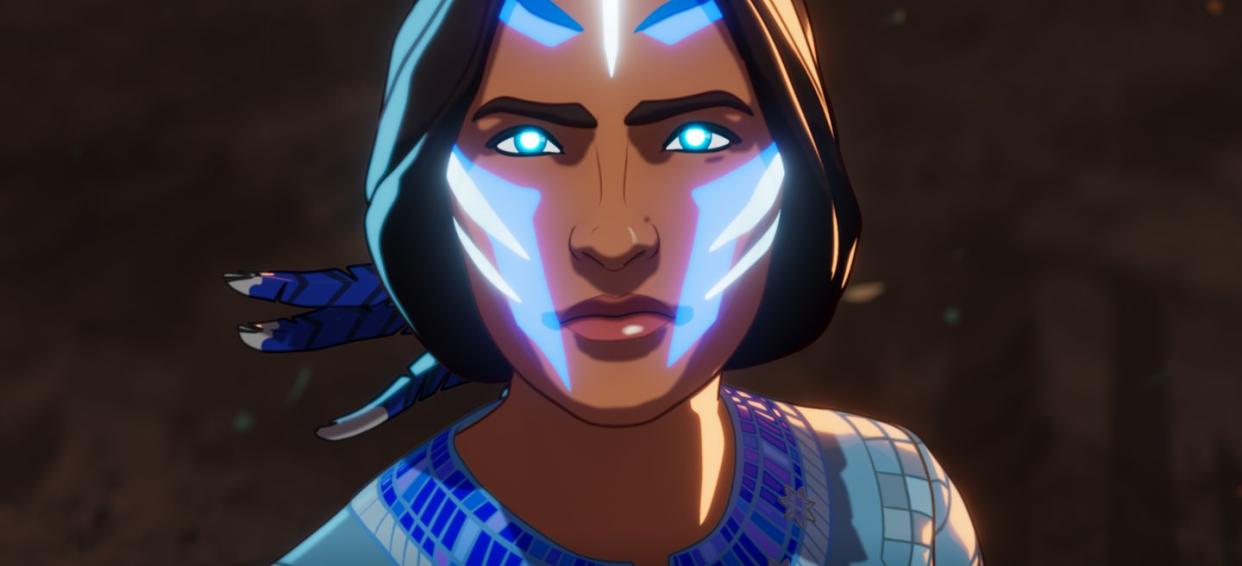
Looking back, can you share an early example of queer representation on screen that has really resonated with you on a personal level?
I didn't realise it was queer at the time, but in hindsight, I was such a nerd for Harriet the Spy growing up. I loved the book. I loved the movie. I loved the '90s Nickelodeon jazzy production with Eartha Kitt and Rosie O'Donnell. Like, come on. I loved it so much that I started spying on my neighbours on my rez and kept a notebook and all of it [Laughs].
During the pandemic, I read somewhere that the author, Louise Fitzhugh, was actually an out gay woman in the '60s. And it all kind of came together for me. I had a moment of being like, "Oh my god. Harriet was a baby queer. I was a baby queer." I just felt so affirmed. I was really emotional and started sobbing. I felt so seen.
As somebody who only really came into my awareness and was able to look within myself and realise who I was as an adult, I felt in my experience that I... When I first came out to my mum, the first thing she said was, "But you're not a lesbian". It was just the experience of invalidating my experiences as if I hadn't been queer this whole time.
For me, reading that fact about Louise Fitzhugh – I've since read her biography, and become even geekier of a fan – in that moment, it's true. All of the breadcrumbs were laid out there.
Having Ole Golly basically give Harriet the advice that, "Sometimes it's okay to lie as long as you're telling the truth to yourself. And it's as a means to protect yourself and protect others, but it's okay to lie if you are telling yourself the truth."
There was another thing about how there's as many ways to live as there are people in the world, and if you don't experience them all, then you're just going to end up living like your parents, which is totally fine. But it was, there were lots of seeds planted throughout the novel and the film that just affirms how queer Harriet was and her mentors were and it just was very meaningful for me.
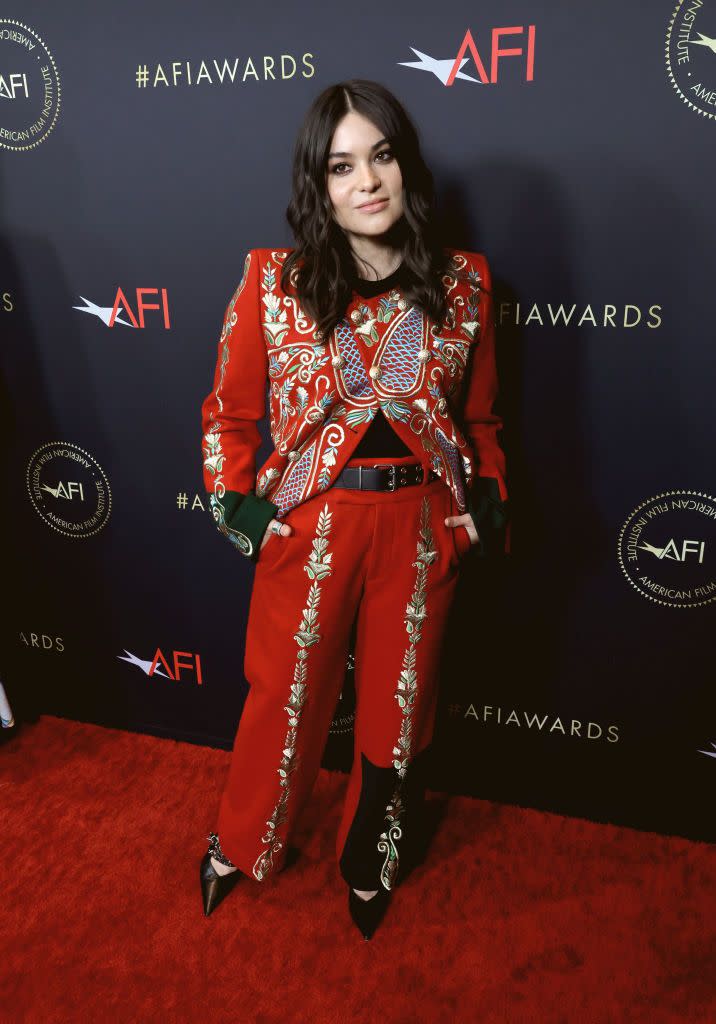
You've achieved so much in your career, but is there any one thing you're particularly proud of? It could be a scene, or a show or something beyond TV and film even.
This is a very small random thing that's buried somewhere on the internet. I was in a book competition. Basically, it's called Canada Reads. It's where there are five Canadian celebrities championing their favourite book for that year. It's a competition of like, which book should all of Canada read that year.
And I won. I won that competition championing a book called Jonny Appleseed by Joshua Whitehead. That was the first time where I had felt like I was really able to see myself and my community in a book.
There was a moment that ended up going, like maybe viral in Canada [Laughs]. That was really vulnerable for me. It was probably more vulnerable than I've ever been in media, but it was a really personally profound moment. My family was also watching live.
There's a quote in the book where it said, "On the rez, I played straight in order to be Indian, and here, in the city, I play white in order to be queer." Having those components of yourself being recognised, reconciling them, and seeing that those two are one and of the same, that my Indigeneity is not exclusive of my queerness, that they are both intrinsically a part of me and my queerness is inherently Indigenous.
That was a moment for me personally and professionally that kind of came together where I felt I was really able to be seen and celebrated and to celebrate Indigenous queerness. I'm still a little embarrassed by it because I was very vulnerable in that moment. But it was something that really impacted me.
Backspot screens again today (March 18) at BFI Flare: London LGBTQIA+ Film Festival.
You Might Also Like
